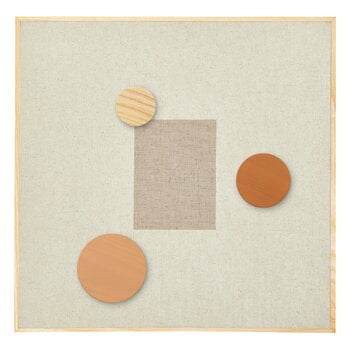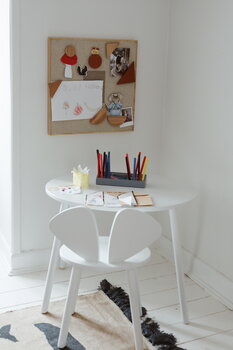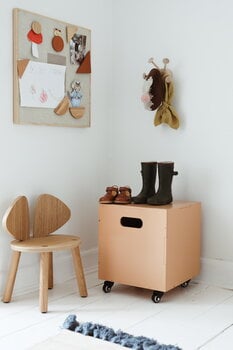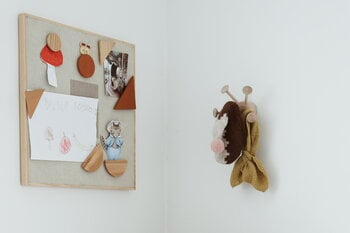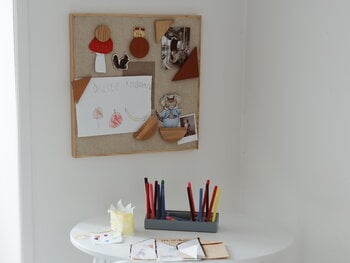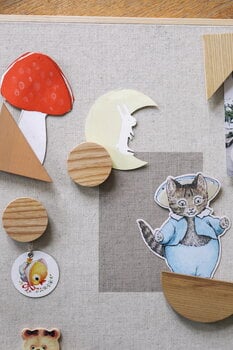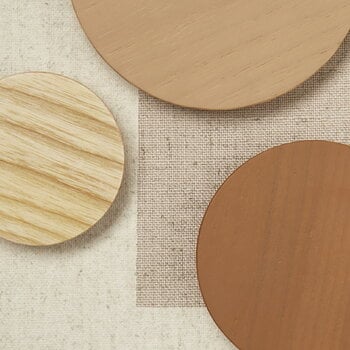Nofred’s notice board is a lovely minimalist memo board for the kids’ room, perfect for displaying the little ones’ works of art, school schedule or photos of friends and family. The board comes with three magnets in ash wood, two of them painted in earthy hues of brown with non-toxic paints. Designed by John Astbury, the notice board has a reduced, timeless look that makes it a lovely addition also to other rooms of the home.
Noticeboard, sand
Nofred
Description
Nofred’s notice board is a lovely minimalist memo board for the kids’ room, perfect for displaying the little ones’ works of art, school schedule or photos of friends and family. The board comes with three magnets in ash wood, two of them painted in earthy hues of brown with non-toxic paints. Designed by John Astbury, the notice board has a reduced, timeless look that makes it a lovely addition also to other rooms of the home.
Product details (8)
- Material
- Ash, magnetic plate, cotton
- Colour
- Beige, ash
- Width
- 51.2 cm
- Depth
- 2.5 cm
- Height
- 51.2 cm
- Weight
- 2.8 kg
- Care instructions
- Wipe frame and magnets with a clean, damp cloth. Use mild soap on stubborn marks. Avoid rubbing and products containing ammonia.
- Notes
- Suspension brackets on the back. Three magnets included.
- Product ID
Designer
John Astbury is an English-born, Swedish-based designer with a versatile background as an anthropologist, boat builder and musician. Astbury graduated in 2011 from industrial design at the Konstfack University College of Arts, Crafts and Design and established his own studio in Stockholm in 2014. He finds inspiration from archetypes and origins and describes his work as a "process of uncovering narratives and symbols within the object and making them visible". Astbury has collaborated with design companies such as Skagerak, Muuto and &Tradition.
View all productsReviews (1)
5
Based on 1 reviews
-
A
Anonimo
Italy
Lavagna molto stilosa, rifinita molto bene con immagine che risponde alla foto.
85 days ago
Sustainability
The Product Sustainability Framework, our criteria of sustainable design, helps you find the most sustainable products in our selection. Read below which sustainability criteria this product has met.
Working conditions & labour 9/9
-
Equal opportunities for all employees
-
Commitment to UN Global Compact, fair compensation for all employees
-
Corporate responsibility requirements defined and communicated for suppliers
-
Systematic work for improved inclusion and well-being in the workplace
-
Transparent supply chain
-
Suppliers' compliance to a code of conduct ensured
-
Direct suppliers audited and certified
-
Compliance to the UN Guiding Principles on Business and Human Rights ensured in the supply chain
-
Support for community involvement in the supply chain
Eco-friendly production 9/9
-
Fair and resource-wise water-use in production
-
No incineration or landfilling of returned items
-
No use of endangered species as materials
-
No direct environmental emissions or waste (excl. GHGs) from production
-
The sustainability of direct suppliers' production is addressed and monitored
-
Production and material sourcing that respect biodiversity, animal rights, and natural ecosystems
-
Material-efficient and ecological packaging
-
Positive impact on nature’s well-being through operations that regenerate natural ecosystems
-
No potentially harmful chemicals used in own production
Climate impact 8/8
-
Company's direct greenhouse gas emissions identified and commitment to reduction
-
Product's carbon impact identified and commitment to reduction
-
Guidance on energy- and eco-efficient use of the product
-
Contribution to climate initiatives beyond the brand’s direct operations
-
Low-carbon or compensated transportation
-
Carbon footprint of the product calculated and goals set to reduce it
-
100 % renewable energy in own production and operations
-
Carbon neutral or carbon negative product
Sustainable materials 6/6
-
Sustainable and long-lasting material choices
-
No harmful or hazardous substances
-
Responsible raw material sourcing and production
-
Materials suited for circularity: monomaterials, recyclable finishings, renewable or recycled contents etc.
-
Ecological materials: natural, biodegradable, recyclable or recycled contents
-
Outstanding materials in terms of innovativeness, responsibility, sustainability and circularity: local production or sourcing, 100 % recycled content, C2C-certification etc.
Circular design 5/5
-
High aesthetic quality promoting long-term use of the product
-
Technically durable product design and material choices
-
Design for enduring life-long quality
-
Design and support for product maintenance, repair and upgradability
-
Innovative circular design solutions: circular service system, resale platform, remanufacturing, collection of used products, etc.
